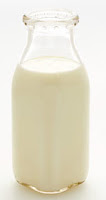So, there we are in our kitchen, mixing our way through an amazing recipe when suddenly we realize that it calls for buttermilk...and of course, we don't happen to have any! What to do, what to do? Never fear, we just do what our grandmothers and great-grandmothers did...we make some! Now, making REAL buttermilk on the spur of the moment is just not feasible, but what some folks don't know is that sour milk can be substituted for buttermilk in nearly any recipe with great results.
Now, a word about "sour milk". The term was coined over a century ago to describe what naturally happens when milk ages, literally beginning a fermenting-type process as the sugars in the milk break down and the milk literally develops a sour taste. The important thing to understand is that there is a HUGE difference between the "sour milk" of yesteryear, and "spoiled milk" of today. Our milk today is commercially pasteurized before going to market, so the natural enzymes and bacteria in the milk are destroyed, making it safer to store for longer periods of time. Because of this, the natural souring process does not take place as the milk ages. Instead, it simply begins to break down as foreign bacteria takes hold, rendering it not only smelly, but genuinely unsafe to consume. So do NOT confuse these two concepts and assume that the old odoriferous milk carton in the fridge is safe to use...it isn't!
So what about sour milk called for in a recipe, or as a substitute for buttermilk? It is simple. One Tablespoon of white or apple cider vinegar added to one cup of milk equals one cup of sour milk. Let it stand for a couple of minutes and you will see the milk thicken slightly from the acid interaction with the proteins and enzymes in the milk...producing a texture quite similar to real buttermilk. If you don't need a full cup, feel free to make the soured milk in smaller amounts! One teaspoon of vinegar sours 1/3 cup of milk, so it is easy to do a very small amount if that is all you need.
Of course, real buttermilk is a nutritious food so if you enjoy dairy products (it IS a full milk product so should NOT be consumed by those with lactose intolerance or casein intolerance issues), consider adding some to your repertoire. Happy cooking!


No comments:
Post a Comment